What is Airbnb Automation? A Guide to Airbnb Management Software

Key Takeaways
Airbnb automation uses property management software and task automation tools to streamline repetitive hosting tasks.
It helps Airbnb hosts and property managers save time, prevent double bookings and improve the guest experience.
Key automations include automated guest messaging, dynamic pricing tools, cleaning schedules, booking calendar sync and smart locks for check-in/out.
For a growing vacation rental business, automation makes it easier to manage multiple properties, attract direct bookings and boost guest satisfaction.
Platforms like Hostaway’s vacation rental software combine all of these features in one place, making Airbnb management seamless and scalable.
Running an Airbnb business is rewarding, but it can also be overwhelming. From constant guest communication to managing calendars and cleaning schedules, many Airbnb hosts quickly realize that hosting is a full-time job. That’s where Airbnb automation makes all the difference.
By using property management software and automation tools, hosts can offload repetitive, time-consuming tasks like messaging, scheduling and updating booking calendars. This not only saves time but also ensures a smoother guest experience.
In today’s competitive vacation rental market, automation is more than just a convenience, it’s essential. Whether you’re managing one listing or multiple listings, smart task automation helps prevent double bookings, streamline operations and keep guests happy.
In this guide, we’ll break down:
What Airbnb automation really means.
The biggest benefits for hosts and property managers.
The must-have tools, from dynamic pricing to automated guest communication, that make an Airbnb business scalable.
By the end, you’ll know exactly how to automate your Airbnb and deliver a better guest experience with less effort.
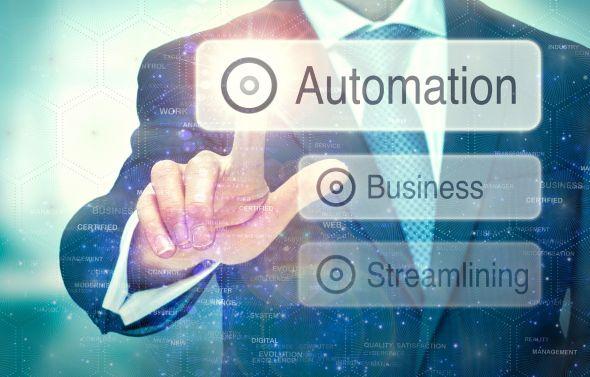
What is Airbnb Automation? Understanding the Basics
At its core, Airbnb automation means handing over routine hosting tasks to technology. Instead of manually sending check-in details or chasing cleaners, hosts can rely on property management software to take care of these processes automatically.
For example, automation can:
Send automated messages to guests with house rules or check-in instructions.
Adjust nightly rates using dynamic pricing tools that monitor demand and competitor listings.
Sync calendars across Airbnb and other platforms to reduce booking conflicts.
Assign and track cleaning tasks so every property is guest-ready on time.
Use smart locks and digital guides to make arrivals and departures seamless.
In simple terms, Airbnb automation is about reducing repetitive, manual work while improving consistency and professionalism. Instead of focusing on routine checklists, hosts can spend their energy on strategy like creating better guest experiences, improving their direct booking website or analyzing performance reports.
Automation doesn’t mean removing the human touch. Instead, it ensures that the most time-consuming hosting responsibilities happen in the background, so hosts can focus on personal connections, local recommendations and building a strong brand presence in the short-term rental industry.
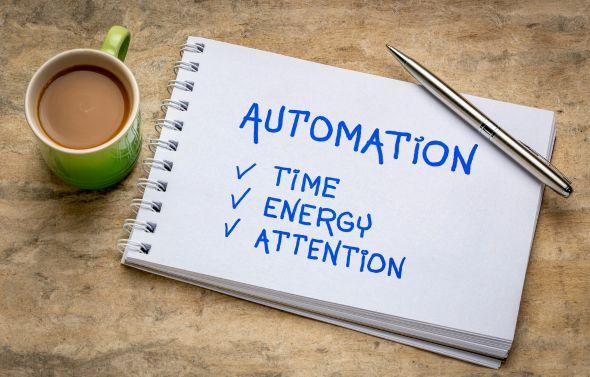
Airbnb Automation vs Manual Hosting at a Glance
Hosting task | Manual approach | Automated approach |
Guest communication | Write and send every message yourself | Automated messages & guest messaging tools |
Task assignments | Call or text staff individually | Automated scheduling & task assignment |
Check-in/out | Meet guests in person every time | Smart locks + automated check-in process |
Reviews | Manually follow up for feedback | Automated guest review requests |
Bookings | Rely heavily on Airbnb’s platform | Direct booking website & repeat direct bookings |
Operations | Constant oversight required | Routine tasks handled in the background |
What Does Airbnb Automation Mean for Hosts?
The shift from manual hosting to automated systems brings clear advantages. By leveraging modern software, Airbnb hosts can reduce repetitive work, improve operations and deliver a smoother experience for every guest. Below are the most impactful benefits.
Save time by reducing repetitive work
Every host faces a long list of repetitive tasks, from sending welcome notes to confirming bookings. Automation tools handle these processes instantly, eliminating the need to do them manually. This not only reduces time spent on day-to-day tasks but also allows hosts to focus on bigger-picture strategies, like marketing and improving the property itself.
Examples include:
Sending automated messages with check-in instructions.
Using automation to schedule and assign tasks to cleaners or staff.
Setting up reminders for recurring tasks like inspections or supply restocking.
Automating these workflows allows hosts to save valuable hours every week.
Prevent mistakes and improve accuracy
Manual management leaves room for oversight, including forgotten messages, missed tasks, and confusion around schedules. Automation ensures consistency and accuracy across the board. For example, assigning tasks automatically prevents delays in property upkeep, while synced calendars reduce scheduling conflicts. The result: fewer errors, less stress and a more professional hosting operation.
Enhance the guest experience
Automation directly improves the guest journey. With tools like guest messaging, smart locks and automated check-in processes, guests enjoy smoother arrivals and departures. Automated reminders and follow-ups can also encourage guest reviews, which are essential for visibility on Airbnb and trust among future travelers.
When guests feel their stay is well-organized, it often leads to more five-star reviews and repeat stays.
Boost direct bookings and revenue
A well-optimized automation setup doesn’t just save you time, it helps grow revenue. By linking to a direct booking website, hosts can encourage guests to book without relying on third-party platforms. Automated workflows keep the booking process consistent, reducing friction and making it easier for guests to complete reservations.
More direct bookings mean fewer fees paid to online travel agencies and more profit for the host.
The Role of Task Automation in Property Management
Behind every smooth Airbnb stay is a long list of tasks that need to happen reliably. From assigning cleaners to preparing welcome notes, hosts deal with dozens of moving parts that can quickly become overwhelming. This is where automation steps in.
Instead of managing each step manually, hosts can rely on digital tools to handle these responsibilities in the background. Simple actions like auto-assigning turnovers, setting reminders for routine checks or scheduling supply restocks ensure that nothing slips through the cracks.
For professional managers, these systems also provide better oversight. A single dashboard can show what has been completed, what’s in progress and what still needs attention. That means less micromanagement and fewer last-minute surprises.
In short, automation takes what was once a reactive process and turns it into a proactive system. Tasks get done on time, properties stay guest-ready and operations run more efficiently with far less hands-on effort.
Examples of task automation for Airbnb hosts
Workflow | How automation helps |
Guest communication | Sends welcome notes, check-in details and follow-up messages automatically |
Task assignment | Notifies cleaners or maintenance staff after a checkout |
Scheduling | Creates recurring reminders for inspections, deep cleans or inventory checks |
Check-in/out process | Uses smart locks and auto-sent instructions for seamless arrivals/departures |
Review requests | Prompts guests for feedback after their stay |
Reporting | Generates occupancy and performance reports without manual effort |
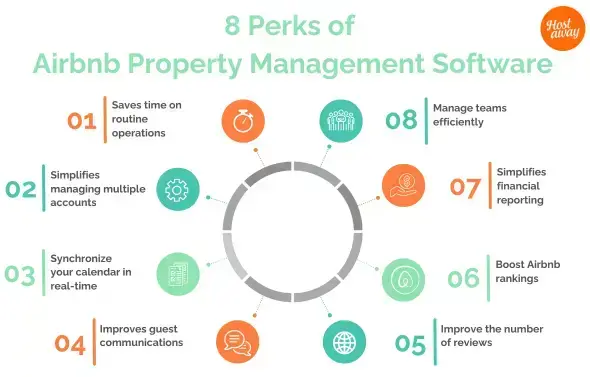
Benefits of Airbnb Automation for Hosts
Airbnb automation isn’t just about convenience it drives measurable business results. For hosts and managers using platforms like Hostaway, the gains are significant across occupancy, efficiency and guest satisfaction.
Growth potential
Automation provides the foundation for scale. Hostaway’s data shows that customers who switched from Guesty grew their listings by 44%, while individual case studies highlight even greater leaps. One property management company, Host Service Group expanded by 642% after adopting Hostaway and Park Place Properties, another firm achieved a 180% increase in managed properties alongside a 400% revenue boost.
These figures highlight how automation enables hosts to grow their businesses without adding proportional workload making expansion both sustainable and profitable.
Occupancy rate increase
For hosts, keeping calendars full is essential. Hostaway reports that customers migrating from Guesty experienced up to a 12.4% increase in occupancy rates. By combining dynamic pricing, trend analysis and customizable reports, automation helps identify opportunities to maximize bookings while staying competitive in the market.
Efficiency and time saved
Manual management is draining, but automation dramatically reduces the burden. According to Hostaway’s 2024 AI report, 35% of surveyed property managers saved the equivalent of four additional workdays per year thanks to automated workflows. One property group even reported becoming at least 100% more efficient after centralizing operations on Hostaway.
This efficiency frees up valuable hours that can be reinvested into strategic growth and guest relations.
Guest reviews and experience
Guest satisfaction is closely tied to reviews and automation helps create the kind of consistency that travelers expect. Hostaway offers a Hosting Quality Dashboard to track performance and identify ways to “boost 5-star reviews.” With tools like automated guest messaging and a unified inbox, hosts can ensure faster replies and smoother interactions all key drivers of positive reviews.
Cleanliness and operational standards
Cleanliness is one of the top factors influencing guest ratings. While specific data points aren’t published, Hostaway includes robust task automation features and integrations with cleaning management tools. These ensure that turnovers happen on schedule and that properties maintain the hotel-quality cleanliness that today’s guests demand.
Key benefits of Airbnb automation
Benefit area | Impact on hosts | Impact on guests |
Occupancy rate | Optimized pricing keeps calendars full | More availability & fair pricing |
Reviews & ratings | More positive reviews thanks to smooth processes | Confidence in booking |
Efficiency | Reduced admin work, less burnout | Faster responses & reliable service |
Cleanliness | Automated task reminders ensure hotel quality cleanliness | Higher comfort levels |
Growth potential | Scales easily with multiple listings | Consistent experience across properties |
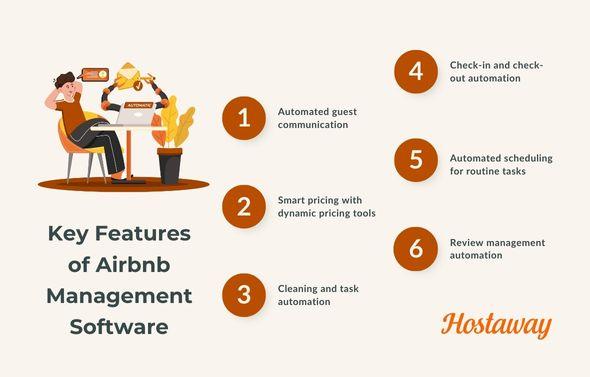
Key Features of Airbnb Management Software
Behind every successful Airbnb operation is a set of powerful tools designed to simplify hosting. From streamlined financial record-keeping for easier revenue tracking to smart home devices in your vacation rental property that balance energy use with guest comfort, automation covers every corner of operations.
Hosts also benefit from real-time dashboards that highlight relevant market metrics, guest data and performance trends, helping them make data-driven decisions. Most importantly, these systems can cut as much as 90% of the time spent on routine operations, giving hosts the freedom to focus on strategy and hospitality.
.jpg?u=https%3A%2F%2Fimages.ctfassets.net%2Fpqmtoyw9z10u%2F41deXTw65MI6dqYPdI3MEP%2F7f642893ce0c615c40991ee8271f299a%2FAutomated_guest_communication___1_.jpg&a=w%3D590%26h%3D377%26fm%3Djpg%26q%3D75&cd=2025-08-22T17%3A20%3A35.688Z)
Automated guest communication
Strong communication is at the heart of every great Airbnb stay, but replying to every inquiry, update or reminder by hand quickly becomes overwhelming. This is where automation transforms the hosting experience.
Modern vacation rental software allows hosts to send pre-scheduled, personalized responses at each stage of the booking journey. Examples include:
Instant replies to new inquiries or booking requests.
Automated pre-arrival notes with directions, Wi-Fi info and check-in details.
Friendly reminders during the stay, such as checkout instructions.
Post-stay thank-you notes that encourage guests to leave reviews.
These automated workflows do more than save time, they directly influence visibility. High response rates contribute to higher rankings in search results on platforms like Airbnb. By ensuring every guest receives timely, professional replies, hosts can strengthen their reputation and stand out in a crowded marketplace.
For prospective guests, quick and consistent communication builds trust and confidence before they ever step into the property. For hosts, it means fewer missed opportunities, smoother operations and more reliable bookings without the need to monitor the inbox 24/7.

Smart pricing with dynamic pricing tools
Setting the right nightly rate is one of the biggest challenges for hosts. Price too high and you risk scaring away bookings, price too low and you leave money on the table. That’s why most successful hosts rely on vacation rental software that includes dynamic pricing features.
These tools automatically adjust rates based on demand, seasonality and competitor listings, ensuring hosts stay competitive without constant monitoring. For example, if local events drive up demand, pricing algorithms can raise rates to capture higher revenue. On the flip side, when demand dips, the system lowers rates to attract potential guests and keep calendars filled.
This level of automation is especially valuable for those scaling a short-term rental business. Rather than checking market data daily, hosts can depend on smart pricing integrations to balance occupancy and revenue. Hostaway's dynamic pricing tool also draws from billions of data point allowing real-time tracking of market metrics, making it easier to spot trends and adapt strategies quickly.
Ultimately, automated pricing helps hosts automate your Airbnb operations more effectively by removing guesswork and ensuring every stay is priced for maximum profitability.
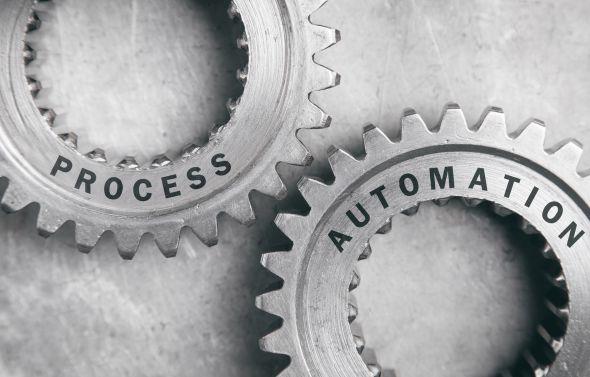
Cleaning and task automation
For many short-term rental hosts and property owners, turnovers are among the most stressful parts of running a rental. Missed cleanings or overlooked details can directly impact reviews, which is why modern vacation rental software includes automation to keep operations running smoothly.
With the right automation software, tasks like cleaning assignments, restocking supplies or property inspections can be scheduled and tracked automatically. Notifications ensure no step is missed and managers can monitor progress in real time from a single dashboard. These helpful features reduce the chance of human error while keeping properties consistently guest-ready.
For those managing more than one property and in multiple platforms, automated workflows are especially valuable. Instead of juggling calls and manual checklists, hosts can use short-term rental management tools that help with automating repetitive tasks to streamline turnovers across multiple listings at once. This not only creates efficiency but also helps maintain the consistent service level that Airbnb guests expect when booking a vacation rental.
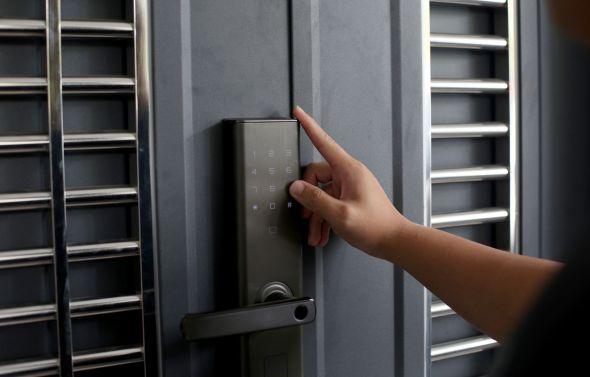
Check-in and check-out automation
Arrivals and departures are often among the most time-consuming tasks for hosts in the Airbnb business, yet they shape the first and last impression of a stay. With automation, the process becomes seamless for both hosts and guests.
Instead of meeting new guests personally when a guest checks in at odd hours or relying on handwritten notes, hosts can send automated check-in details and check out instructions through their vacation rental software. Paired with smart access solutions, guests can arrive at their convenience without waiting on the host.
Automation also helps manage guests by ensuring rules are communicated clearly and departures happen on time. This reduces stress for hosts and sets realistic guest expectations, improving overall satisfaction.
For potential guests, a smooth arrival experience can be the deciding factor when comparing listings. And for hosts aiming to automate your Airbnb, modern property management systems make it easy to provide the consistency of a professional hotel without the manual workload.
By removing friction from the booking process, check-in and check-out automation not only enhances the guest journey but also frees hosts from one of the biggest operational bottlenecks in vacation rentals.

Automated scheduling for routine tasks
Managing a rental means juggling dozens of small but essential duties: inspections, supply restocking, maintenance checks and calendar updates. These may not seem urgent on their own, but together they become some of the most time-consuming aspects of hosting.
With modern property management software, hosts can automate these schedules so that nothing slips through the cracks. For example:
Maintenance reminders can be set months in advance.
Supplies can be tracked and replenished on a recurring basis.
Turnover staff can receive assignments automatically after checkout.
By automating these workflows, hosts reduce time spent chasing the details and gain confidence that every task will be completed consistently.
Automation also adds protection against missed steps that could impact performance. For instance, synced calendars offer double booking protection, ensuring that reservations never overlap, reducing guest frustration and keeping operations smooth without having to keep tabs on guests manually.
For new guests, this reliability translates into a better guest experience from the moment they book. And for hosts aiming to automate your Airbnb, scheduled workflows mean fewer manual checklists, less stress and more bandwidth to focus on growth rather than day-to-day upkeep.

Review management automation
For Airbnb hosts, reviews are the lifeblood of success. High ratings influence search rankings, increase trust with travelers and ultimately drive more bookings. But managing reviews can be difficult when handling multiple listings or responding to dozens of stays each month.
This is where review management automation comes in. Instead of manually asking each guest for feedback, a property management system can automatically send follow-up messages, thank guests for their stay and encourage them to leave ratings. By standardizing this process, hosts increase the likelihood of receiving timely responses without adding extra work.
Automation also supports hosts in maintaining high quality over time. Integrated task automation dashboards can track performance across properties, highlight areas that might impact guest ratings and flag opportunities for improvement. These insights allow hosts to address issues before they turn into complaints, ensuring consistency across every stay.
For those ready to automate your Airbnb, review management is one of the easiest wins. It combines technology-driven reminders with actionable insights, helping hosts secure more 5-star feedback and build the long-term reputation needed to stay competitive in the vacation rental industry.
Summary of key features in Airbnb management software
Feature | What it does | Why it matters |
Automated Guest Communication | Sends instant replies, pre-arrival notes, reminders and thank-you follow-ups | Improves response rates → higher Airbnb rankings and stronger trust with potential guests |
Smart Pricing Tools | Adjusts nightly rates based on demand, competitor pricing and relevant market metrics | Maximizes revenue while keeping calendars full |
Cleaning & Task Automation | Auto-assigns turnovers, schedules maintenance and tracks supply restocks | Keeps properties guest-ready and prevents missed tasks |
Check-In & Check-Out Automation | Provides digital access, auto-sends arrival and check-out details | Meets modern guest expectations for convenience and reliability |
Automated task scheduling | Creates reminders for maintenance, inspections and recurring staff duties | Saves the time spent on manual oversight and reduces risk of double bookings |
Review Management Automation | Automates review requests, tracks performance and flags issues via dashboards | Increases 5-star feedback and helps hosts with reputation building |
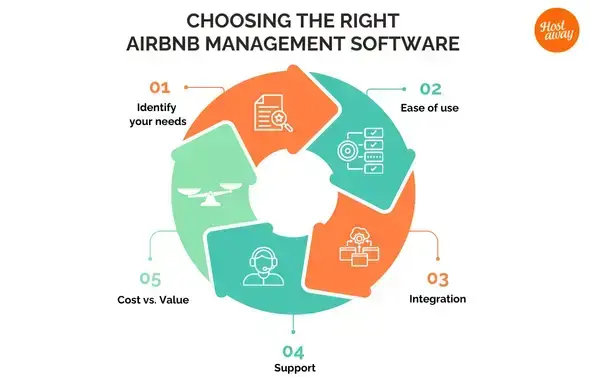
Choosing the Right Airbnb Property Management Software
With so many tools on the market, selecting the right platform can feel overwhelming. Look for a system that aligns with your business goals, simplifies operations and scales as you grow.
Features to look for in automation software
When evaluating providers, focus on whether they deliver real-world efficiency. Essential features include:
Centralized calendar management.
Integrated communication tools to ensure timely guest interactions.
Dynamic pricing capabilities that adapt to market conditions.
Task scheduling and cleaning coordination to keep turnovers reliable.
Reporting dashboards for performance tracking and growth planning.
In short, the right software should help you manage the details while freeing you to focus on strategy.
Property management system vs vacation rental software
Hosts often encounter the terms property management system (PMS) and vacation rental software, sometimes used interchangeably. While both are designed to streamline hosting, a PMS typically offers deeper functionality for multi-property portfolios, including advanced integrations and financial reporting.
Vacation rental software, on the other hand, often emphasizes guest-facing tools like communication and booking workflows. The best solutions combine both approaches, ensuring you get the flexibility to scale without sacrificing the guest-facing experience.
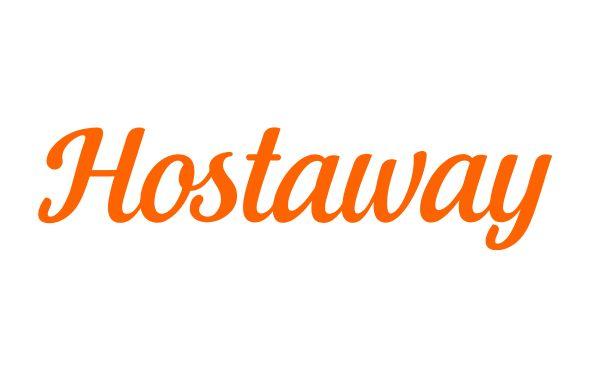
Why Hostaway Stands Out
Among today’s leading platforms, Hostaway is known for providing an all-in-one solution that grows with your business. Instead of juggling multiple apps, hosts can manage messaging, pricing, cleaning, reporting and marketing from a single dashboard.
What sets Hostaway apart is its flexibility. Whether you’re just starting out with one listing or managing a larger portfolio, the platform scales with you. Hosts can take advantage of advanced automation while still customizing touchpoints to maintain a personal connection with guests.
With integrations across major booking channels, task coordination tools and a user-friendly property management system, Hostaway makes it easier than ever to automate your Airbnb without losing the personal touch that earns loyal guests.

The Smarter Way to Automate Your Airbnb
Automation has transformed the way hosts run their businesses. What once required constant manual oversight, can now be streamlined with a few clicks. The result is more efficiency, less stress and a hosting experience that feels professional and consistent.
For guests, automation means smooth communication, reliable check-ins and the confidence that every stay will meet expectations. For hosts, it means scaling a business without sacrificing quality or burning out on repetitive tasks.
The key is choosing the right property management software, one that balances powerful task automation with the flexibility to keep your hosting style personal. Automation isn’t about replacing hospitality, it’s about giving you the freedom to focus on what matters most: welcoming guests and building a business that lasts.
FAQs About Airbnb Automation and Property Management Software
1. Can Airbnb automation tools integrate with smart home devices like thermostats or cameras?
Yes. Many modern automation platforms integrate with smart home devices such as thermostats, locks and security cameras. These integrations allow hosts to control access, monitor energy use and enhance security, all while providing guests with a smoother stay.
2. Is automation software only useful for short-term rental hosts or can it work for long-term rentals too?
While automation is most commonly associated with short-term rental management, many features like messaging, payment tracking and reporting also benefit long-term rental hosts. The key difference is that short-term rentals tend to use a broader range of automation, including turnover scheduling and frequent guest messaging.
3. How does automation software help prevent revenue loss during off-season periods?
Automation platforms often include revenue management tools that adjust pricing based on market metrics, demand trends and local events. By lowering prices during low-demand times and increasing them when demand spikes, hosts can maintain steady occupancy and reduce the risk of under-booked calendars.
4. What role does guest data play in improving automation workflows?
Guest data such as booking history, preferences and past reviews helps hosts personalize automated messages, improve upselling opportunities and predict demand. When managed correctly, this data allows automation systems to create better guest journeys without adding extra work for the host.
5. How do property owners benefit from automation if they hire property managers?
For property owners who hire managers, automation ensures that operations are consistent and transparent. Owners can receive detailed performance reports, track time spent on operations and see occupancy and revenue metrics in real time. This makes it easier to evaluate management effectiveness and build trust between owners and their managers.
Ready to find out how Hostaway can transform your business?
